|
|
|
Sort Order |
|
|
|
Items / Page
|
|
|
|
|
|
|
| Srl | Item |
| 1 |
ID:
127636
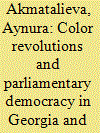

|
|
|
|
|
| Publication |
2013.
|
| Summary/Abstract |
The media of Kyrgyzstan described Georgia after the Rose Revolution of 2003 as a country that has made giant strides in economic recovery, suppressing corruption, and reform of its police and education system. The two countries increased their cooperation after the Tulip Revolution of 2010 in Kyrgyzstan; today, it has taken the form of an exchange of diplomatic and political experience and youth programs. Trade turnover between the two countries is expected to top $1.4 million.
These two Soviet successor-states, which adhere to different sociocultural and economic traditions, chose a practically identical road leading first to the presidential form of government and then to parliamentary democracies. This choice made after the color revolutions of 2003 in Georgia and 2005 and 2010 in Kyrgyzstan was suggested by the universal model of democracy that had gained popularity all over the world and was primarily a mechanism for legitimizing the power of the new people inside and outside the country. So far, parliamentary democracy in both countries has not developed enough to produce unambiguous results. It is much more important to understand how the changes were accepted and substantiated through an analysis of public discussions, discussions in the media and on the Internet, as well as in official documents, interviews, and statements by the leaders.
|
|
|
|
|
|
|
|
|
|
|
|
|
|
|
|
| 2 |
ID:
129652
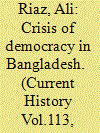

|
|
|
|
|
| Publication |
2014.
|
| Summary/Abstract |
Since its independence in 1971, Bangladesh has experienced tumultuous times. The country endured prolonged military rule from 1975 to 1990, but democratic aspirations have defined the course of its politics. In the past four decades, Bangladesh has experimented with various systems of governance, including one party presidential rule and, currently, a multiparty parliamentary system, having returned to parliamentary democracy in 1991. Bangladesh has demonstrated favorable elements of democracy, such as high levels of political participation, a plethora of political parties, a growing middle class, a vibrant civil society, and periodic elections. Yet the nation has undergone repeated reversals of democratic gains, thanks to civilian authoritarianism and military dictatorship. The polity has suffered from an absence
of strong institutions to ensure the rule of law, accountability, and transparency in governance.
|
|
|
|
|
|
|
|
|
|
|
|
|
|
|
|
| 3 |
ID:
113665
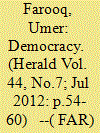

|
|
|
| 4 |
ID:
140905
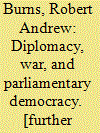

|
|
|
|
|
| Publication |
Lanham, University Press of America, 1985.
|
| Description |
52p.pbk
|
| Standard Number |
0819146102
|
|
|
|
|
|
|
|
|
|
|
|
Copies: C:1/I:0,R:0,Q:0
Circulation
| Accession# | Call# | Current Location | Status | Policy | Location |
| 027000 | 997.11/BUR 027000 | Main | On Shelf | General | |
|
|
|
|
| 5 |
ID:
117121
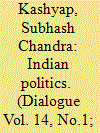

|
|
|
| 6 |
ID:
094968
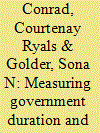

|
|
|
|
|
| Publication |
2010.
|
| Summary/Abstract |
Existing studies of government duration in parliamentary democracies typically measure the length of a government's tenure in office without accounting for delays in the government formation process. By assuming that a cabinet leaves office on the day prior to the new cabinet taking office, these measures ignore periods during which a government has lost its mandate but is still legally in power as a caretaker government. A consequence is that governments that are actually stable and governments that only appear stable because replacement governments take a long time to form are observationally equivalent. This suggests that some existing studies of government stability are potentially flawed. It also means that a number of interesting research questions cannot be answered with existing data. Many of these questions address the various consequences of caretaker governments. The answers to these questions are relevant for scholars interested in representation and accountability. This article presents a new dataset collected on government duration in eleven Central Eastern European democracies from 1990 to 2008 that specifically takes account of caretaker periods and delays in the government formation process. These data will provide scholars with more flexibility to choose the measure that best reflects their underlying conception of government stability.
|
|
|
|
|
|
|
|
|
|
|
|
|
|
|
|
| 7 |
ID:
115891
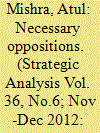

|
|
|
|
|
| Publication |
2012.
|
| Summary/Abstract |
For the longest part of the two decades since the end of the Cold War, there were mostly Indian perspectives, rather than debates, on Iran and bilateral relations. Domestic debates on Iran began in 2005 and continued until mid-2008, reaching a crescendo during this period and dissipating soon after. The debates, when they took place, were not about influencing the government's Iran policy. Rather they were the necessary oppositions that emerged from specificities of India's domestic politics in which coalition compulsions, parliamentary democracy and ideological differences played their part.
|
|
|
|
|
|
|
|
|
|
|
|
|
|
|
|
| 8 |
ID:
117124
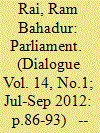

|
|
|
| 9 |
ID:
141524
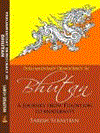

|
|
|
|
|
| Publication |
New Delhi, Adroit Publishers, 2015.
|
| Description |
xi, 269p.hbk
|
| Standard Number |
9788187393153
|
|
|
|
|
|
|
|
|
|
|
|
Copies: C:1/I:0,R:0,Q:0
Circulation
| Accession# | Call# | Current Location | Status | Policy | Location |
| 058356 | 321.805498/SEB 058356 | Main | On Shelf | General | |
|
|
|
|
| 10 |
ID:
117123
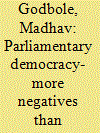

|
|
|
| 11 |
ID:
113670
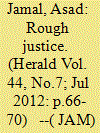

|
|
|
| 12 |
ID:
127686
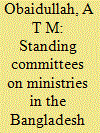

|
|
|
|
|
| Publication |
2011.
|
| Summary/Abstract |
Since parliamentary democracy in Bangladesh was restored in 1991, the reorganisation of parliament has become the centre of attention. Development partners have been keen on organisational and institutional reforms in parliament to make a meaningful shift to the parliamentary system that was put in place abruptly and without adequate preparations. This transformation called for a revision of rules and the modernisation of the parliamentary secretariat, rejuvenating the committee system. This article highlights the major steps taken in the reorganisation of the standing committees of the parliament in Bangladesh, in an attempt to increase the parliament's institutional/oversight capacity on the executive. It traces the weaknesses of the parliamentary standing committees of the early 1990s, findings and recommendations of the major reform measures and the state of affairs in the aftermath of reforms. However, strengthening parliamentary committees and their oversight capacity on the executive needs systemic and institutional changes, which calls for strong political commitment and strategic leadership on the part of senior parliament management and change in the mindset of the executive.
|
|
|
|
|
|
|
|
|
|
|
|
|
|
|
|
|
|
|
|
|